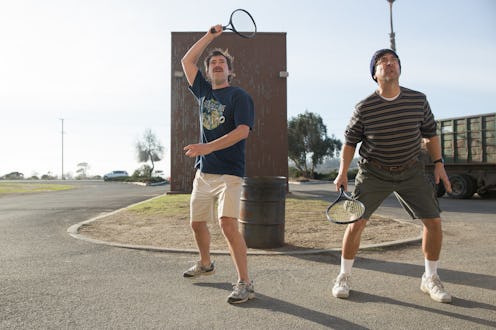
When Ray Romano appeared in the offbeat indie rom-com The Big Sick in 2017, it seemed like the comedian found the perfect sweet spot between comedy and drama. It was only a matter of time until Romano would star in another Sundance darling, and so he does in 2019's Paddleton. On Feb. 22, the movie hits Netflix, as part of a four-picture deal with producers Mark and Jay Duplass, per IndieWire. Romano's awkward sensitivity shines in the buddy comedy. He and Mark Duplass, play a pair of friends who bond on an unfortunate road trip. While Paddleton isn't a true story, like The Big Sick, you'll likely find it realistic, relatable, and just as emotional.
The road trip that Paddleton comes about after Duplass' character, Michael, gets diagnosed with terminal cancer. The two men, who are both neighbors and pals, embark on a journey to a town six hours away in order to fulfill Michael's prescription for the pills that will end his life by what's called physician assisted death. This type of medical care, in which a medical professional prescribes a lethal dose of a medication to a terminally ill patient, is legal in Washington D.C., Hawaii, Oregon, Colorado, Vermont and Washington state, and as of June 2018, it's legal in California — though litigation challenging the law is currently underway, CNN reports. Since Paddleton is set in California, it's not a far-reaching plot.
While Paddleton tells a realistic story of a person's choice to end their life after falling terminally ill, it doesn't depict the stage of a person's illness when they commonly make this decision. Notably, the Death with Dignity National Center, which spearheads national campaigns to legalize physician assisted death based on the Oregon model, states that 97 percent of people who opt for physician-assisted death in Oregon are already using hospice care. In California, where Paddleton takes place, you won't find similar data about the people who have taken advantage of California End of Life Option Act as it has not been in effect as long.
Though Michael chooses to end his life before entering the stage in his illness that would require hospice care, the movie still remains an honest portrayal of what sorts of feelings might arise while facing one's mortality. In fact, a lot of Paddleton's dialogue was improvised by the actors, as the film's script was only 20 pages long when production started, per The Playlist. Director and writer Alex Lehmann told the outlet, "As far as the content, you know that you’re going to have to get from point A to point B, and B and C are going to come up in rehearsal or in the first take or two... to give the actors freedom to find the scene." The improvisation from Romano's character results in many asides about things like ostriches and what one does if they run out of gas in a remote area, but anyone who's ever been unsure of what to say to a person with a terminal diagnosis will probably understand how strange everyday conversation can seem.
The movie gets its name from the made-up game they play, which is a variation on racquetball involving trash cans.
So if the whole plot sounds shockingly mundane for the subject matter, that's because Duplass and Lehmann set out to make a movie that people could relate to. Lehmann explained to The Playlist that the movie really is just about two male friends who might be generally "overlooked or labeled weird or quirky."
Spoilers ahead. The physician assisted death does take place at the end of the movie. And you'll probably feel it deeply, especially after falling in love with two quirky guys who might remind you of people you actually know.
If you or someone you know is considering self-harm or experiencing suicidal thoughts, call the National Suicide Prevention Hotline at 1-800-273-8255 or text HOME to the Crisis Text Line at 741741.